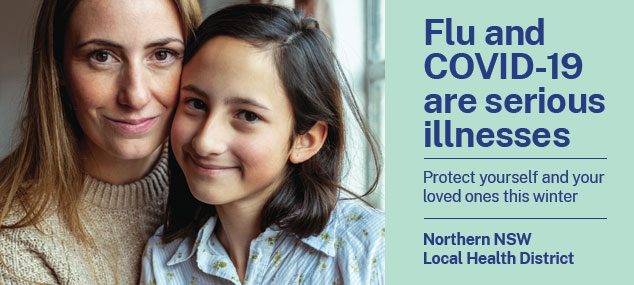
The North Coast Public Health Unit is encouraging people to get their influenza vaccine and take a few simple steps to avoid serious illness from the flu this winter.
Across the Northern NSW Local Health District there has been a total of 383 flu cases for the year to 21 May, with a third of those recorded in the last week.
Flu is circulating widely in the community for the first time in two years, after significantly lower cases during the height of the COVID-19 pandemic. During 2021, a total of seven cases of flu were recorded across the District, and 230 cases were recorded during 2020.
Acting Director North Coast Public Health Unit, Robin Auld said it was important to get vaccinated now, with winter just a week away.
“Those considered to be at higher risk of severe illness from influenza are eligible for a free flu vaccine. This includes children from six months to under five years of age; Aboriginal and Torres Strait Islander people from six months of age; people with serious health conditions, pregnant women, and people aged 65 and over,” Mr Auld said.
Everyone over the age of 6 months can have the flu vaccine and we encourage everyone to get vaccinated to protect our community. We strongly encourage parents of children aged between six months and five years old to get them vaccinated without delay.
With COVID-19 also circulating in the community, we continue to encourage people to keep up to date with their COVID-19 vaccinations, and it is safe to get both the COVID-19 and flu vaccines at the same time.
An additional COVID-19 booster dose (or ‘winter booster’) is recommended for those at higher risk of serious illness. For those who have had COVID, they can have their next dose three months after infection.
“As well as getting up to date with your shots, we should all be practicing a few simple but effective measures to prevent spread of respiratory illness this winter,” Mr Auld said.
We can help reduce the COVID-19 and flu risk to ourselves and others by:
- staying home if we're unwell, taking a COVID-19 test straight away and self-isolating
- wearing a mask indoors or wherever we can't physically distance
- getting together outdoors or in large, well-ventilated spaces with open doors and windows
- practising good hygiene by washing or sanitising hands often
- taking a rapid antigen test to test for COVID-19 before visiting vulnerable loved ones or going to large gatherings and events
- staying up to date with our vaccinations - for both flu and COVID-19.
Regular information on the flu and COVID-19 is reported in the NSW Respiratory Surveillance Report, published weekly.